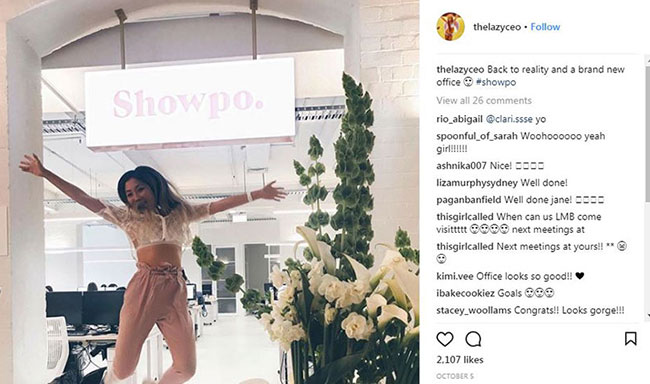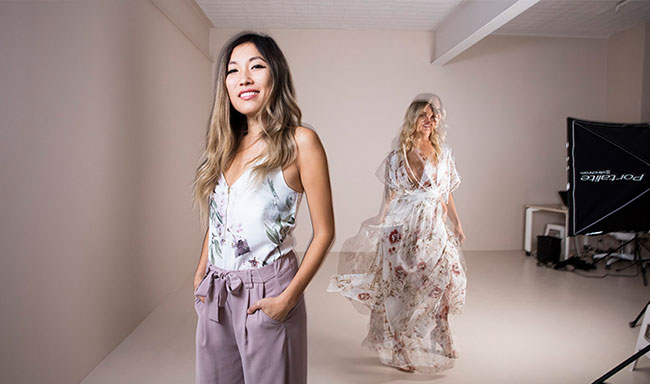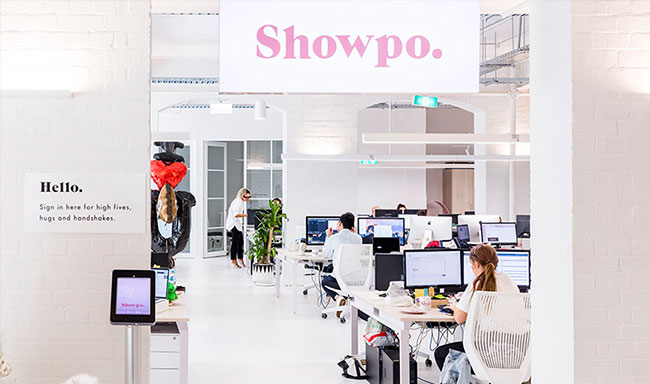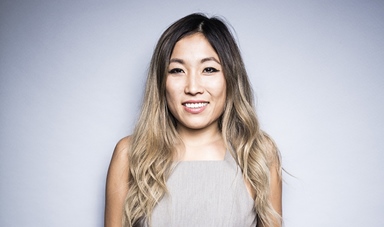Loading component...
At a glance
On a hot summer’s day in December 2017, Jane Lu was sitting with her feet up on a table in the Showpo offices in Sydney, feeling a little worse for wear.
Lu, 31, and her business partner and part-time mentor Alex Durkin, 28, had spent the previous evening at a networking event held by the National Online Retailers Association.
As with everything Lu does, she’d gone in hard: the tagline on her Instagram account, thelazyceo, is “work hard, play hard, more wine, less whine” and, as if to prove it, she’d posted a photo of herself and Durkin behind the DJ decks, Lu looking glam in tight jeans and a midriff shirt – champagne in hand.
Lu could be forgiven for having a little fun: with less than three weeks until Christmas, most of Sydney was wrapped up in the silly season.
However, Lu had more to celebrate. Her online fashion empire turned over more than A$30 million in sales in 2017 – impressive for a business founded in her parents’ garage only seven years earlier.
From debt to debut
The former KPMG cadet and EY analyst founded online fashion hub Showpo when she was A$60,000 in debt.
As well as women’s fashion and beauty items, all priced at less than A$100, Showpo sells homewares, pet accessories, inflatable pool toys and reuseable cups for takeaway coffee.
The affordable dresses, must-have floral playsuits and party rompers with names like Caught My Eyes and Felt So Right are aimed at 18- to 34-year-olds and made in China, with Lu’s wholesale suppliers based in Sydney. There’s a best-selling item – but she won’t tell me what it is.
The groovy, girly aesthetic, which she admits “kind of all just happened by accident”, clearly works – although Showpo’s healthy revenue figure would indicate that Lu is quite strategic about what she sells.
"You can't ever trust what you're doing now is going to work in a few months' time"
With its seven years of online sales, Showpo has racked up a valuable trove of data on what sells and what doesn’t.
“We’ve got, like, 13 or 15 people on our product side: the buying team,” says Lu.
“We know what prints, shapes, patterns, and so on the girls are buying,” but she is quick to add that her team has a natural flair and an eye for fashion, too. “That’s how they pick the winners,” she says, smiling.
What also helps sales is the enviable lifestyle Lu flaunts on social media: @thelazyceo (her Instagram account) is rife with colourful cocktails, bare midriffs and European travel adventures, while the Showpo Instagram posts are also carefully crafted.
The latest styles adorn pretty girls at home, next to swimming pools and in flower baths (yes, they’re a thing), and shoots are interspersed with quotes (“I don’t understand why couples do three-month anniversary posts, I’ve had cups in my room longer than that,” one reads), as well as pictures of cute babies and adorable dogs. The Instagram feed has 1.3 million followers globally; Showpo’s Facebook account has 1.07 million followers.

Social reach
A self-confessed Facebook addict, Lu admits she spent much of her time at EY on the social platform, learning the ins and outs of how it works for business.
“Snapchat has died because Instagram has created its own Insta stories,” she says.
“But I’ve previously said that Facebook is dead, and that it doesn’t have viral, organic reach. But now because we’re really making great media content [there’s a Showpo blog], Facebook is doing really well for us again.”
“Jane is always at the forefront of the latest social media trends,” says her friend and fellow “girl boss” Gen George, the founder of the OneShift job-matching platform, who met Lu about three years ago on the start-up panel circuit.
Passionate supporters of women in business, the two co-founded the networking group Like Minded Bitches Drinking Wine, in 2015.
George calls Lu “the social media whisperer” and says she has a special talent for testing channels and finding the best one at the right time.
“She gets the wave of organic growth, then knows when to tap out and find the next up-and-coming big thing,” she says.
Unlike other fashion brands aimed at millennials, Showpo does not align itself with ethically sourced fashion and makes no claims to do so.
“The brand is very fun,” says Lu. “It’s lively, colourful … it’s a fashion brand that doesn’t take itself too seriously.”
It does, however, sell its samples worn briefly in shoots, and donates the proceeds to The Hunger Project Australia, a non-profit that aims to break the cycle of poverty by funding projects in Africa and elsewhere.

The birth of Showpo
Lu’s mother was a banker in China and her father an engineer; they emigrated from Beijing to Sydney when Lu was eight.
Unable to speak much English, Lu’s parents worked as cleaners while they adapted to their new life.
There was a lot riding on the success of their only child, who went to the selective Sydney Girls’ High, did extremely well in her HSC, studied commerce at the University of New South Wales and nabbed a prized traineeship at one of the Big Four accounting firms.
However, when a friend offered Lu a partnership in a fashion venture, Fatboye, she quit EY to pursue it. She says now she didn’t care what type of business she started, only that she “wanted to get out of corporate life” and leave the office cubicles behind.
The story goes that, not wanting to disappoint her parents, Lu pretended to still be working at EY for six months after she resigned, donning a suit and carrying an empty laptop bag as she caught the bus into town each day with her mother.
“I would run out of my house, pretending to go to work, and then I’d come back home with my business partner and work on it,” Lu says.
“We’d leave before my dad came home and pretend to come home later. There was that whole charade for a while.”
When Fatboye failed, Lu spent her time wandering the streets and going to cafes. Once she couldn’t afford the cafes, she sat in the State Library of NSW “trying to decide my next move”.
Showpo – originally called Showpony – was formed over “a few too many glasses of red wine” with another business partner.
With no outside funding, Lu built the Showpo website herself with the help of some YouTube tutorials and opened a bricks-and-mortar store on Sydney’s Broadway with a fit-out that cost about A$1000.
Stores in Pitt Street and Bondi Westfield shopping centre soon followed. From there, sales doubled month-on-month and the business snowballed.
Eighteen months in, Lu bought out her business partner, preferring to go it alone. She removed shipping charges, optimised Facebook ads and began using Google Ads. By 2013, she had shut the three stores.
“It was a hard decision to make because the store in the city was a cash cow,” she says.
“We saw that the sales were starting to decline and online was picking up so much momentum. And at this point, you know, we were quite resource-constrained.
"Besides the people in the stores and the people packing, we had one girl doing customer service, a couple of casuals picking and packing. But in terms of the brains of the business, it was just myself and Alex [Durkin], our general manager … we knew we had to do it.”
In 2017, Lu debuted on the Australian Financial Review Young Rich list with an estimated wealth of A$32 million. Her goal is to turn over A$100 million by 2020.
Online boom or bust
Australians now spend more than A$23.6 billion each year with online retailers, according to the NAB Online Retail Sales Index from October 2017, with the highest spend in the fashion sector among those aged between 18 and 34.
Showpo relies on DHL for deliveries and sells to “everywhere they will ship to ... like, 80 countries,” says Lu.
The US is a major market and 30 to 40 per cent of the business is international sales. In the Sydney metro area, orders over A$50 have free shipping and those placed before 3pm are dispatched the same day.
By comparison, Amazon, which launched in Australia in December, offers next-day delivery for A$9.99 and free shipping for orders over A$49.
It’s a “pretty big space” says Lu, when asked how she feels about sharing the market with the online juggernaut.
“In the short term, I think the biggest thing is, are they going to change consumer expectations about your service offerings? Then, in the long term, you know because everyone is going to keep up with Amazon, it’s going to make us more competitive on a global scale.
"International sales are so important. We are already trying to do that – with or without Amazon.”
It’s a big space, but it can also be a small pond.
Earlier this year, Showpo settled a data breach dispute with online retailer Black Swallow, after Showpo alleged one of its former graphic designers had downloaded the company’s entire customer database and passed it on to her new employers.
“Hiring the wrong people: that can really screw you over,” Lu says, “but you kind of have to learn that the hard way. Like not entering into long-term contracts; I always try and minimise the contracts we get in now.”
She says she never had a business plan and, even today, the company has projects, goals and targets, but not a plan as such.
“I think it’s really important in this industry to be agile,” she says by way of explanation.
“We learn so much on the job and when we bring in new people to join the team. We want people we hire to be part of the decision process. We don’t want to dictate; it’s a collaborative effort.
“Social media is so important for us and, you know, they change the algorithm all the time,” she says.
“You can’t ever trust that what you’re doing now is going to work in a few months’ time.”
Investor interest
Lu has been dismissive of investors so far, but confirms she gets a lot of interest.
“We just don’t want someone to answer to because what we’re doing is so different and, in a way, disruptive.
“We have a team of execs, we have a board adviser and then my general manager, who’s been with me for five years. She acts kind of like a business partner. We just don’t need someone else who’s not in the business to have an opinion on the business.”
She thinks the problem with taking investor money is in justifying how you use it.
“You’re going to be taking more risks,” she explains.
“You’re going to have this pressure to have a return on investment. You start looking at not being profitable and, you know, for us, feeling comfortable is, like, really important.
"We never want to invest more money than we could [afford to] lose because we want to have that reserve.”

A savvy operator
In spite of her carefree attitude, Lu admits the journey has been tough.
“You know, especially at the start, where things haven’t been going well. Back in the day, I made the mistake of watching competitors too closely, and then you kind of lose a sense of who you are.
“It’s not a winner-takes-all market. It’s just about making the business that you are making yourself. I think what I’ve learned that’s been really important over the last few years is that you’re only in control of your own actions. That’s all you can control – whatever happens.”
With a staff of 43, Lu’s focus is now on leading by example.
“A good leader is someone who … clarifies expectations, which I’m not necessarily that good at but I’m working on it,” she says.
“And, I think, someone that your team believes in.”
She works hard to foster a “winning” culture, “where everyone’s contributing and playing for a winning team. Like, everyone feels very important and part of the team here.”
Ironically, she is yet to hire an in-house accountant, so that role has fallen to her – but Lu is adamant she will never return to corporate life.
“I just know how much it’s not really for me,” she says.
“And you know, ideally, I would be able to keep doing this forever. I think I got quite lucky with it and I’ve become good at doing what I’m doing. But, you know, I’m not a serial entrepreneur that can just go off tomorrow and start up another business.”
Lu says whenever she or Durkin are tempted to take a big risk and invest big in something, they ask each other, “Do you want to go get real jobs?”
“‘If this fails, we’re going to have to go out in the real world and get jobs.’ “And it’s like, ‘OK then, let’s not. Let’s not do it,’ she says with a laugh. “That’s kind of, like, our greatest fear.”
Lu's vision
“I think it’s about having small goals and trying to be better every day than you were yesterday. That way you’re not disappointed in yourself. You’re competing with yourself and not chasing this pipedream years down the line.”
Best piece of advice
“We used to be called Showpony and, as we started selling more and more internationally, I realised that we couldn’t keep that name. There were so many others; it’s a common turn of phrase.
“At that time I thought our brand was all we had. I probably put too much emphasis on it. I was heartbroken when I realised we couldn’t keep that name. I thought, ‘I’ve failed again’.
“My boyfriend’s dad – he’s not a business person, he’s an ophthalmologist – was like, ‘Oh, you know if you want to have longevity in the business world, you have to adapt, you have to change. This is part of the game.’
“It was his way of saying ‘Harden up; get over it. This is the risk, this is why you do what you do.’
“It’s sometimes good when people get you to snap out of it and you kind of move from sulking to problem-solving.”

